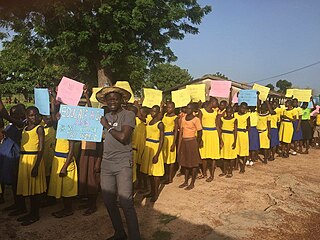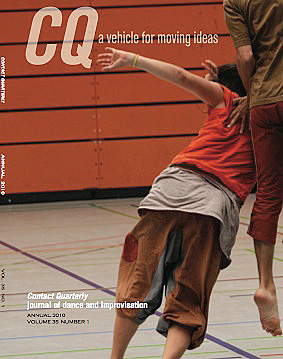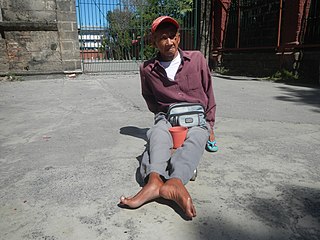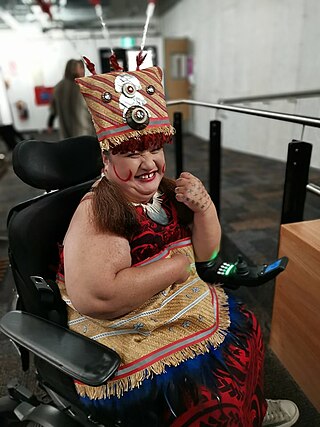Related Research Articles
Special education is the practice of educating students in a way that accommodates their individual differences, disabilities, and special needs. This involves the individually planned and systematically monitored arrangement of teaching procedures, adapted equipment and materials, and accessible settings. These interventions are designed to help individuals with special needs achieve a higher level of personal self-sufficiency and success in school and in their community, which may not be available if the student were only given access to a typical classroom education.
Contact improvisation is a form of improvised partner dancing that has been developing internationally since 1972. It involves the exploration of one's body in relationship to others by using the fundamentals of sharing weight, touch, and movement awareness. It has evolved into a broad global community of social dancing around "jams" characterized by their welcoming attitude towards newcomers to dance, as well as seasoned practitioners, and is often found overlapping with ecstatic dance communities.
Inclusive design is a design process in which a product, service, or environment is designed to be usable for as many people as possible, particularly groups who are traditionally excluded from being able to use an interface or navigate an environment. Its focus is on fulfilling as many user needs as possible, not just as many users as possible. Historically, inclusive design has been linked to designing for people with physical disabilities, and accessibility is one of the key outcomes of inclusive design. However, rather than focusing on designing for disabilities, inclusive design is a methodology that considers many aspects of human diversity that could affect a person's ability to use a product, service, or environment, such as ability, language, culture, gender, and age. The Inclusive Design Research Center reframes disability as a mismatch between the needs of a user and the design of a product or system, emphasizing that disability can be experienced by any user. With this framing, it becomes clear that inclusive design is not limited to interfaces or technologies, but may also be applied to the design of policies and infrastructure.

Mainstreaming, in the context of education, is the practice of placing students with special education needs in a general education classroom during specific time periods based on their skills. This means students who are a part of the special education classroom will join the regular education classroom at certain times which are fitting for the special education student. These students may attend art or physical education in the regular education classrooms. Sometimes these students will attend math and science in a separate classroom, but attend English in a general education classroom. Schools that practice mainstreaming believe that students with special needs who cannot function in a general education classroom to a certain extent belong in the special education environment.

Inclusion in education refers to all students being able to access and gain equal opportunities to education and learning. It arose in the context of special education with an individualized education program or 504 plan, and is built on the notion that it is more effective for students with special needs to have the said mixed experience for them to be more successful in social interactions leading to further success in life. The philosophy behind the implementation of the inclusion model does not prioritize, but still provides for the utilization of special classrooms and special schools for the education of students with disabilities. Inclusive education models are brought into force by educational administrators with the intention of moving away from seclusion models of special education to the fullest extent practical, the idea being that it is to the social benefit of general education students and special education students alike, with the more able students serving as peer models and those less able serving as motivation for general education students to learn empathy.

AXIS Dance Company is a professional physically integrated contemporary dance company and dance education organization founded in 1987 and based in Oakland, California. It is one of the first contemporary dance companies in the world to consciously develop choreography that integrates dancers with and without physical disabilities. Their work has received nine Isadora Duncan Dance Awards and nine additional nominations for both their artistry and production values.

Disability in the arts is an aspect within various arts disciplines of inclusive practices involving disability. It manifests itself in the output and mission of some stage and modern dance performing-arts companies, and as the subject matter of individual works of art, such as the work of specific painters and those who draw.
The Remix Dance Project is a South African contemporary dance company that "brings together performers with physical disabilities and performers without".
The physically integrated dance movement is part of the disability culture movement, which recognizes and celebrates the first-person experience of disability, not as a medical model construct but as a social phenomenon, through artistic, literary, and other creative means.

Contact Quarterly (CQ) is a contemporary dance magazine established in 1975, with a focus on improvisation and performance. In addition to its periodical publications, the magazine sponsors symposia, workshops, and other programmes to support of contemporary movement arts. It is recognized for its role in supporting the "contact improvisation" dance movement.

Mithu Alur is the founder chairperson of The Spastic Society of India – now rechristened ADAPT – Able Disable All People Together. She is an educator, disability rights activist, researcher, writer and published author on issues concerning people with disability in India.

Rodney Bell is a male dancer born in Te Kuiti, North Island, New Zealand.
Uma Tuli is an Indian social worker, educationist and the founder of Amar Jyoti Charitable Trust, a Delhi-based non-governmental organisation, working for the rehabilitation of physically disabled people. She was honoured by the Government of India, in 2012, with the fourth highest Indian civilian award of Padma Shri.
Disability Studies in Education (DSE) is a field of academic study concerned with education research and practice related to disability. DSE scholars promote an understanding of disability from a social model of disability perspective to "challenge social, medical, and psychological models of disability as they relate to education". A DSE perspective situates disability within social and political context and is concerned with the civil and human rights of students with disabilities, including issues of equity, access, and inclusion in educational settings, curricula, and activities. DSE emerged as a part of the broader, interdisciplinary Disability Studies movement and as a critique of special education. Special education (SPED) in the United States emerged after the signing of the Individuals with Disabilities Education Act in 1975, marking the shift in educational rights by explicitly making the refusal of educational access illegal. Over the past few decades, special education has grown into an established academic curriculum and program which aims to enhance individuals with disabilities’ performance by focusing on changing their given educational environments and the limitations placed on them to foster growth and opportunities. SPED aims to build a caring society that accepts and celebrates different abilities without stigmatizing individuals with disabilities. Through SPED, students should be able to engage in learning and have opportunities for growth through education each and every day. Though SPED has good intentions for creating learning opportunities for students, there is a constant tension between DSE and SPED, primarily around the idea that disability studies in education should be inclusive of students with and without disabilities in order to best foster awareness and understanding of disability studies. SPED lacks the challenge of the social model of disability which is seen in DSE.
Poper Scientific Stand Up is the first Latin American stand-up comedy group that is engaged in the popularization of science. It is an independent continuation of an early 2015 initiative by Diego Golombek, which was made in conjunction with the Ministry of Science, Technology and Innovation, Tecnopolis and TECtv. The proposal was to invite university students and graduates of different science fields to participate in a Scientific Stand Up comedy course given by renowned humorist Diego Wainstein, for them to create monologues with scientific content. Using the Stand Up format as a resource, they speak about scientific topics to all age groups, whether they have previous knowledge or not, and they also talk about scientists as people and about the perception of science in society. The name "Poper" is a pun on the initials of "Popularización Entre Risas", and a tribute to Epistemologist Karl Popper.
Kitty Lunn is a ballet dancer, actor, disability activist, and founder of Infinity Dance Theater, a company that features performers with disabilities.
Maria Verónica Reina was an Argentine educational psychologist and activist who campaigned internationally for disability rights. Representing the International Disability and Development Consortium, she was a leading contributor to negotiations on the United Nations Convention on the Rights of Persons with Disabilities.
Marisa Hamamoto is a Japanese-American professional dancer and social entrepreneur based in California, United States. She is the founder and artistic director of Infinite Flow, a Los Angeles-based nonprofit and professional dance company composed of dancers with and without disabilities.

Climate change disproportionately effects individuals with disabilities, both directly and indirectly. Individuals with disabilities are more likely to experience the effects of climate change on humans more acutely compared to those without disabilities. Typically, disabled people are the most likely to be negatively affected by any form of emergency, whether it be an immediate emergency like a flood or tornado or a gradual emergency like rising sea levels, due to a lack of access to emergency resources and the difficulties imposed by limited mobility. Disabled people are also more adversely affected by climate change because a disproportionate number of disabled people live in poverty, and people living in poverty are inherently more at risk due to climate change. Despite this, and despite the fact that disabled people make up more than 15% of the global population, they have had minimal input and involvement in the decision-making process surrounding responses to climate change. A 2022 study by the Disability-Inclusive Climate Action Research Programme revealed that only 37 of 192 State Parties to the Paris Agreement currently refer to persons with disabilities in their nationally-determined contributions, while only 46 State Parties refer to persons with disabilities in their domestic climate adaptation policies.

Touch Compass is a professional inclusive dance company in Aotearoa New Zealand established in 1997 that has disabled and non-disabled dancers. They have been at the forefront of inclusive dance in New Zealand and have 'paved the way for many dancers and companies across the country.' They create contemporary dance, dance-theatre performance and film. They also have an education programme and have run workshops, community classes and education for schools.
References
- ↑ "Home". DanceAbility International. Retrieved July 16, 2012.
- 1 2 Bertens, Johannes Willem and Douwe Fokkema, ed. (1997). International Postmodernism: Theory and Literary Practice. John Benjamins Publishing Company. pp. 154–5. ISBN 9789027234452.
- 1 2 Bjornstad, Randi (November 6, 2011). "Freedom to Move, Oregon Life". The Register Guard. Eugene, Oregon. Archived from the original on May 27, 2012. Retrieved July 16, 2012.
- 1 2 "History". DanceAbility International. Retrieved July 16, 2012.
- 1 2 "Artistic Director Biography". Joint Forces Dance. Retrieved July 16, 2012.